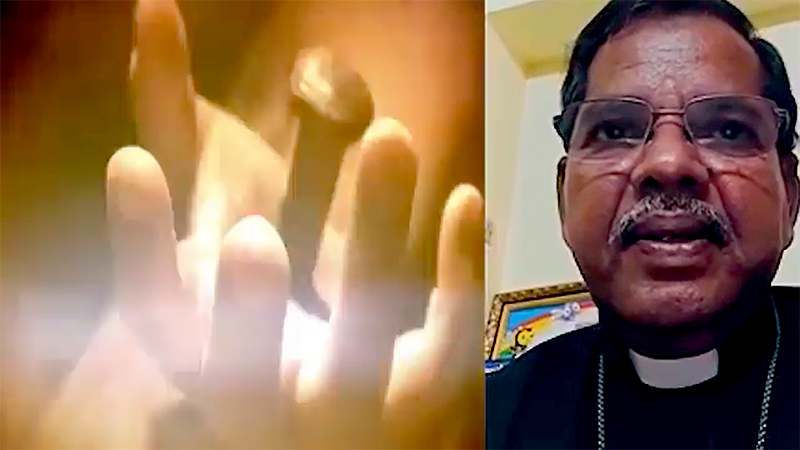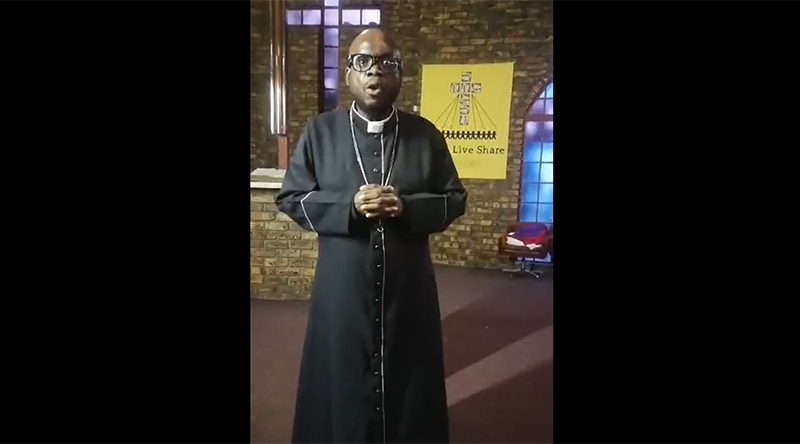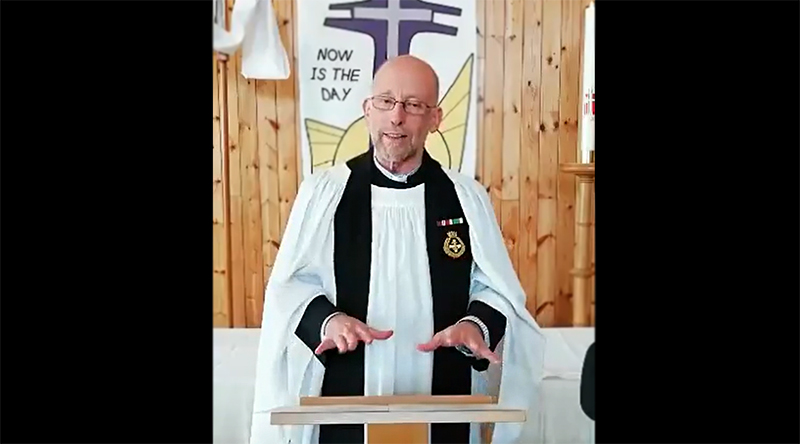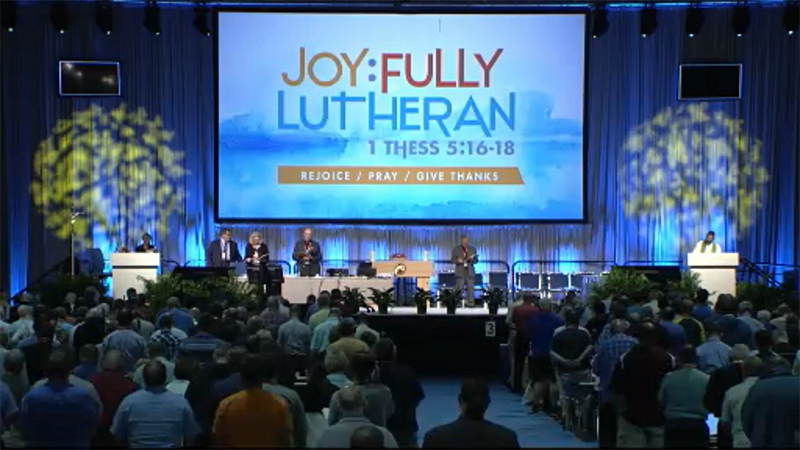
President S. Suviseshamuthu brings a video Easter greeting to the India Evangelical Lutheran Church.
WORLD – Members of the International Lutheran Council (ILC) continue to respond to the coronavirus pandemic currently gripping the world.
In this second post in our series, we highlight the situation of ILC member churches in India, South Africa, and the United Kingdom.
India
A nationwide lockdown in India was implemented on March 23, and will continue at least through the end of April. So far, India has reported more than 12,700 cases of COVID-19 and 423 deaths.
The situation has proven challenging for the India Evangelical Lutheran Church (IELC). Worship services are banned, which was particularly difficult during Holy Week and Easter. Some pastors and congregations are able to broadcast services online, and some members are able to watch from their homes. The church, however, is unable to administer Holy Communion during the lockdown.
Movement from one place to another is also restricted. And while some pastors are allowed to visit nearby homes to pray with members, in other places this is not allowed.
On the eve of Easter, IELC President S. Suviseshamuthu sent a message of encouragement to the church on YouTube and WhatsApp, likening the situation facing them to that described in the first chapter of Joel. Joel describes a crisis that had “never happened during the time of old men, the inhabitants of the land,” President Suviseshamuthu writes. “The priests, the Lord’s ministers, mourn. The field is wasted. The land mourns. Joy is withered away from the sons of men. The meat offering and the drink offering are withheld form the house of your God.”
“But in the very next chapter, Joel speaks of the day of the Lord,” President Suviseshamuthu continues. If we “rend our hearts and turn unto the Lord our God,” we will find “He is slow to anger, and of great kindness, if we repent from evil.”
“This makes us to realize that Jesus is the only way,” President Suviseshamuthu explains. “He loves us profoundly. That is the only reason He laid down His life on the cross. Jesus loves each one of us without discrimination. Let us separate ourselves from the world to be united only with our Saviour. Let us confess daily. May the Lord protect us and lead us through the wilderness.”
South Africa
In South Africa, more than 2,500 cases of COVID-19 have been reported, with 34 deaths. On March 23, the country enacted a nationwide lockdown, which will be in effect at least until the end of April.
This has led to major challenges for the St. Peter Confessional Lutheran Church of South Africa (CLCSA). Churches are not allowed to gather in groups of more than ten, funerals are limited to just family, and no weddings are allowed. Easter services were cancelled in South Africa, as in many nations.

Online preaching from the St. Peter Confessional Lutheran Church of South Africa.
Many churches around the world have turned to electronic means of ministering to members during the current crisis, and the CLCSA is no different, reaching out via social media. But many of the CLCSA’s members are elderly and not familiar with this sort of technology. Many are also rural, living in remote areas which do not have easy access to the internet.
“Our church is in a learning curve as to how to serve our membership,” explains CLCSA bishop Mandla Khumalo. “We have learned and are learning even more the importance of households becoming the church, with fathers effectively being encouraged to go back to using Luther’s Small Catechism to minister to their families.” Bishop Khumalo notes especially the value of the daily services in the catechism. “This is leading us to understand more fully what fellowship means on the family level—how the church begins at home, and how the worship building is only a place of fellowship.”
The CLCSA is facing other difficulties as a result of the coronavirus too. Holy communion and visitations, including to shut-ins, have been suspended, and pastors can only attend to members in extreme cases after receiving permission from the authorities. Some international staff have also been repatriated, further affecting the ability of church and its agencies to minister to its members.
The church is also facing financial difficulties since many of its members are unfamiliar with telephone or online banking, and are unable to give in person. And this has a cascading effect on the church’s education and social ministry work. The church receives no government funding, and with schools closed, there are challenges paying staff and covering overhead costs. What is more, many of the students depend on the church’s food program and now face food insecurity as a result of the lockdown.
Despite these challenges, Bishop Khumalo also sees an opportunity to reach people anew with the good news of the Gospel during this crisis. Some people who normally “would not attend church in any way” are nevertheless deciding to tune-in to the CLCSA’s online outreach “because of the curiosity created by this pandemic.” The church is proclaiming the message of Jesus to those newly willing to listen.
United Kingdom
The United Kingdom has so far reported more than 103,000 cases of COVID-19 and 13,729 deaths since the beginning of the pandemic. On March 20, the government initiated a lockdown which resulted in churches being closed for public worship and which strictly limited the public’s ability to leave their homes. While clergy have been categorized as key workers, and can thus leave the home to work, congregants are not allowed to attend churches.

ELCE Chairman George Samiec livestreams his sermon for Easter Sunday.
The Evangelical Lutheran Church of England has reacted quickly to the situation to ensure continued pastoral care for members. By March 29, all congregations had begun offering alternate worship arrangements, including online video conferencing, live online worship services, pre-recorded worship services, and written material emailed or posted every week for members to read on Sunday.
“The absence of the Divine Service in the life of the Church is painful,” notes ELCE Chairman George Samiec. “We look forward to the time when we can worship together and receive from the Lord of the Church all His blessings.”
In the meantime, congregations continue to use alternate means to continue ministry. Some congregations are also now broadcasting Matins and Compline during the week, while Bible Studies and confirmation are being conducted via video conferencing. Congregational WhatsApp groups have been formed. And pastors are regularly phoning members to provide care.
The ELCE’s theological institute, Westfield House, has moved to provide classes online. And Lutheran Radio UK has amended the Daily Offices on Sundays to include sermons and prayers.
The ELCE ministerium is also using video conferencing to consult with one another, Chairman Samiec noted, to “learn from each other in terms of technology, to think collectively about how to go forward and what to do to minimise any ‘digital divides’, and how best to resume public worship if COVID-19 fears still exist.”
The situation also puts a strain on the fiscal well-being of congregations. To that end, the ELCE Executive Council has established a ‘hardship fund’ to help congregations deal with financial stresses.
———————
For more news and information from the International Lutheran Council about the COVID-19 pandemic, click here.

